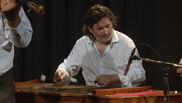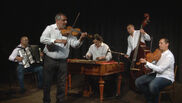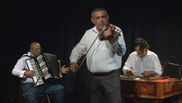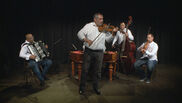Monika Siváková - Talking
created: 10. 01. 2022 13:15 modified: 10. 01. 2022 13:15
Monika Sivakova comes from the village of Brekov. She was 52 during the interview. She comes from the working-class family. She graduated from the secondary grammar school in Humenné. She has two adult children. She speaks about the local Romani community, the co-existence with the majority, about the Romani language and the significant cultural and social changes.
The regional history of the Roma living in the village of Brekov is the subject of audio recordings that DICRK obtained free of charge from researcher Elena Cinová. Her research project called Brekov Roma in the Flow of Time was supported in 2020 by the Fund for the Support of the Culture of National Minorities. Guided interviews are in Slovak and bring closer the life and culture of the Roma and their perception of social change in the region.
category: speaking
tags: retrospective biographical dialogue guided Slovak Monika Siváková general audience internal
Etela Kirvejová - Talking
created: 10. 01. 2022 11:59 modified: 10. 01. 2022 12:00
Etela Kirvejová comes from the village of Brekov. She was 75 in the time of the interview. Her father worked in mines, later in Czech Republic, her mother worked as the cleaning lady at the post-office. She speaks about the local Romani community, their life with the majority, about the Romani language and signifcant cultural and social changes.
The regional history of the Roma living in the village of Brekov is the subject of audio recordings that DICRK obtained free of charge from researcher Elena Cinová. Her research project called Brekov Roma in the Flow of Time was supported in 2020 by the Fund for the Support of the Culture of National Minorities. Guided interviews are in Slovak and bring closer the life and culture of the Roma and their perception of social change in the region.
category: speaking
tags: retrospective biographical dialogue guided Slovak Etela Kirvejová general audience internal
Ervín Tokár - Talking
created: 10. 01. 2022 11:42 modified: 10. 01. 2022 11:43
Ervín Tokár was born in the village of Naciná Ves he comes from the family of five children. He married a woman from Brekov and went to live there. He speaks about the local Romani community, their co-existence with the majority as well as about the significant cultural and social changes.
The regional history of the Roma living in the village of Brekov is the subject of audio recordings that DICRK obtained free of charge from researcher Elena Cinová. Her research project called Brekov Roma in the Flow of Time was supported in 2020 by the Fund for the Support of the Culture of National Minorities. Guided interviews are in Slovak and bring closer the life and culture of the Roma and their perception of social change in the region.
category: speaking
tags: retrospective biographical dialogue guided Slovak general audience internal
Marta Tokárová - Talking
created: 10. 01. 2022 11:23 modified: 10. 01. 2022 11:23
Marta Tokárová was born in the village of Naciná Ves. Her father came from Brekov. She was 68-year-old in the time of the interview. She talks about the local Romani community, their co-existence with the majority, about the Romani language as well as about the significant cultural and social changes.
The regional history of the Roma living in the village of Brekov is the subject of audio recordings that DICRK obtained free of charge from researcher Elena Cinová. Her research project called Brekov Roma in the Flow of Time was supported in 2020 by the Fund for the Support of the Culture of National Minorities. Guided interviews are in Slovak and bring closer the life and culture of the Roma and their perception of social change in the region.
category: speaking
tags: retrospective biographical dialogue guided Slovak Marta Tokárová general audience internal
Mária Gunárová - Talking
created: 10. 01. 2022 11:09 modified: 10. 01. 2022 11:09
Mária Gunárová from the village of Brekov, she was 82 at the time of the interview. She was born in the village of Roztoky (Svidník district). She went to the village Brekov. In the interview, he talks about the local Roma community, and coexistence with the majority, about the Roma language and significant cultural and social changes.
The regional history of the Roma living in the village of Brekov is the subject of audio recordings that DICRK obtained free of charge from researcher Elena Cinová. Her research project called Brekov Roma in the Flow of Time was supported in 2020 by the Fund for the Support of the Culture of National Minorities. Guided interviews are in Slovak and bring closer the life and culture of the Roma and their perception of social change in the region.
category: speaking
tags: retrospective biographical dialogue guided Slovak Mária Gunárová general audience internal
Koloman Gunár - Talking
created: 10. 01. 2022 10:24 modified: 10. 01. 2022 10:26
Ing. Koloman Gunár comes from the village of Brekov, he was 71 at the time of the interview. From his father's side he comes from a family of musicians, after his mother he is from a family of blacksmiths. From 1967 to 1972 he was a student at the University of Technology, Faculty of Civil Engineering in Bratislava, Department of Civil Engineering. He worked at the District Agricultural Administration in the investment department. In 1990, he co-founded a political party called the Roma Integration Party.
The regional history of the Roma living in the village of Brekov is the subject of audio recordings that DICRK obtained free of charge from researcher Elena Cinová. Her research project called Brekov Roma in the Flow of Time was supported in 2020 by the Fund for the Support of the Culture of National Minorities. Guided interviews are in Slovak and bring closer the life and culture of the Roma and their perception of social change in the region.
category: speaking
tags: retrospective biographical dialogue guided Slovak Koloman Gunár general audience internal
On Balog's Church; This Way, This Way - Alexander Daško's Dulcimer Band
created: 20. 12. 2021 09:50 modified: 20. 12. 2021 09:50
Alexander Daško's dulcimer band plays the Slovak folk songs: On Balog’s Church; This Way, This Way.. The band was formed in 1992 in Banská Bystrica. The band's repertoire consists of Romani, Slovak and other nations’ folk music as well as operetta and film melodies. The band has released several CDs. The lead violinist is Alexander Daško. Dulcimer - Dezider Oláh Axman. Viola - Otto Daniš (Buli). Double bass - Jozef Berky (Kangaroo). Accordion - Štefan Bučko (Kefa). Alexander Daško founded the Lavuta Private Elementary Art School in Banská Bystrica, he is a music teacher. Every year, A. Daško organizes the festival of Roma culture in Banská Bystrica, called Gypsy Fire.
category: music
tags: instrumental modern folk quintet borrowed Alexander Daško's Dulcimer Band general audience internal
Aušvicate o kher baro/There is Big House in Auschwitz - Alexander Daško's Dulcimer Band
created: 20. 12. 2021 09:08 modified: 20. 12. 2021 09:15
Alexander Daško's dulcimer band plays the Roma sad song (halgato) Aušvicate o kher baro/There is Big House in Auschwitz. The band was formed in 1992 in Banská Bystrica. The band's repertoire consists of Romani, Slovak and other nations’ folk music as well as operetta and film melodies. The band has released several CDs. The lead violinist is Alexander Daško. Dulcimer - Dezider Oláh Axman. Viola - Otto Daniš (Buli). Double bass - Jozef Berky (Kangaroo). Accordion - Štefan Bučko (Kefa). Alexander Daško founded the Lavuta Private Elementary Art School in Banská Bystrica, he is a music teacher. Every year, A. Daško organizes the festival of Roma culture in Banská Bystrica, called Gypsy Fire.
category: music
tags: instrumental modern folk quintet borrowed Alexander Daško's Dulcimer Band general audience internal
Odoj avel o vonato/There Comes the Train - Alexander Daško's Dulcimer Band
created: 20. 12. 2021 08:57 modified: 20. 12. 2021 08:57
Alexander Daško's dulcimer band plays the Roma sad song (halgato) Odoj avel o vonato/There Comes the Train. The band was formed in 1992 in Banská Bystrica. The band's repertoire consists of Romani, Slovak and other nations’ folk music as well as operetta and film melodies. The band has released several CDs. The lead violinist is Alexander Daško. Dulcimer - Dezider Oláh Axman. Viola - Otto Daniš (Buli). Double bass - Jozef Berky (Kangaroo). Accordion - Štefan Bučko (Kefa). Alexander Daško founded the Lavuta Private Elementary Art School in Banská Bystrica, he is a music teacher. Every year, A. Daško organizes the festival of Roma culture in Banská Bystrica, called Gypsy Fire.
category: music
tags: instrumental modern folk quintet borrowed Alexander Daško's Dulcimer Band general audience internal
Veša, veša, churde veša/Woods, Woods, Small Woods - Alexander Daško's Dulcimer Band
created: 20. 12. 2021 08:47 modified: 20. 12. 2021 08:47
Alexander Daško's dulcimer band plays the Roma song Veša, veša, churde veša/Woods, Woods, Small Woods. The band was formed in 1992 in Banská Bystrica. The band's repertoire consists of Romani, Slovak and other nations’ folk music as well as operetta and film melodies. The band has released several CDs. The lead violinist is Alexander Daško. Dulcimer - Dezider Oláh Axman. Viola - Otto Daniš (Buli). Double bass - Jozef Berky (Kangaroo). Accordion - Štefan Bučko (Kefa). Alexander Daško founded the Lavuta Private Elementary Art School in Banská Bystrica, he is a music teacher. Every year, A. Daško organizes the festival of Roma culture in Banská Bystrica, called Gypsy Fire.
category: music
tags: instrumental modern folk quintet borrowed Alexander Daško's Dulcimer Band general audience internal











